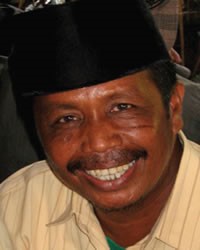Cia-Cia, South Butonese in Indonesia

Photo Source:
Copyrighted © 2026
Anonymous All rights reserved. Used with permission |
Send Joshua Project a map of this people group.
|
| People Name: | Cia-Cia, South Butonese |
| Country: | Indonesia |
| 10/40 Window: | Yes |
| Population: | 94,000 |
| World Population: | 94,000 |
| Primary Language: | Cia-Cia |
| Primary Religion: | Islam |
| Christian Adherents: | 2.00 % |
| Evangelicals: | 0.00 % |
| Scripture: | Portions |
| Ministry Resources: | No |
| Jesus Film: | Yes |
| Audio Recordings: | Yes |
| People Cluster: | Tukangbesi of Sulawesi |
| Affinity Bloc: | Malay Peoples |
| Progress Level: |
|
Introduction / History
The Cia-Cia people are found throughout the southern part of Buton island, generally in the more rural areas. They also inhabit the remote island of Batu Atas (south of Buton) as well as the eastern half of the island of Binongko in the Wakatobi island chain.
The Cia-Cia can be found inland and in coastal communities. In the 1970s, the government forced most of the villages to move to the coast so they could better provide for themselves, but a few remained inland. The land they live in is still undeveloped. A large portion of it has been set aside as a national forest because of the large number of rare species of animals that live there.
What Are Their Lives Like?
The Cia-Cia make their living as farmers or fishermen, depending on where their village is located. Those close to the sea make a living fishing and seaweed farming. Those living inland grow cashews, corn, cassava, cacao and in some cases coffee. Some of the inland villages have no running water and no water source other than collected rainwater.
Foreign companies looking for oil and other minerals are exploring the Cia-Cia land. Buton island has the largest deposit of natural asphalt in Southeast Asia. Some Cia-Cia work in a couple of asphalt mines. In general, the Cia-Cia distrust people coming and taking their land without providing benefits or obtaining their approval first.
The Cia-Cia have always had a close relationship with the Wolio and members of these groups often dwell in close proximity to one another, especially around the outskirts of the city of Baubau. The port city of Pasarwajo on the southeastern side of Buton is the current seat of the district of Buton and is the largest city of Cia-Cia.
The Cia-Cia take great pride in their traditional laws and customs of the Cia-Cia, especially in the few remaining mountain communities.
What Are Their Beliefs?
Almost all Cia-Cia people have identified with Sufi Islam (a mystical version of Islam), but the Hindu and animistic traditions of their past are very active. They practice meditation to receive visions from God, or to find hidden truths far beyond their own reasoning. Dreams are seen as solid spiritual evidence about how they should conduct themselves.
In some villages, the Cia-Cia still offer food and flowers at the graves of ancestors to obtain blessings for the approaching harvest. The Cia-Cia also believe that evil spirits cause illnesses, while helpful spirits give guidance. There are a few villages whose inhabitants hike to the top of a mountain in the area for a week every year to conduct several rituals regarding the year to come.
What Are Their Needs?
The Cia-Cia need training and assistance to better manage their natural resources. They need formal education as well as practical training to take advantage of employment opportunities. They also need more medical attention, clinics and medical personnel.
Scripture portions and the JESUS Film are available in the Cia-Cia language.
Prayer Points
Ask God to give the Cia-Cia dreams and visions of Jesus to prepare them for hearing and receiving the gospel.
Pray for the translation of the entire New Testament into Cia-Cia.
Ask God to raise up committed prayer for the Cia-Cia to lay the groundwork for a significant response to the gospel.
Ask God to send the Cia-Cia workers to take the gospel to them and to help them with training and education.
Pray for a Disciple Making Movement among the Cia-Cia that will transform this group and spill over into nearby peoples.